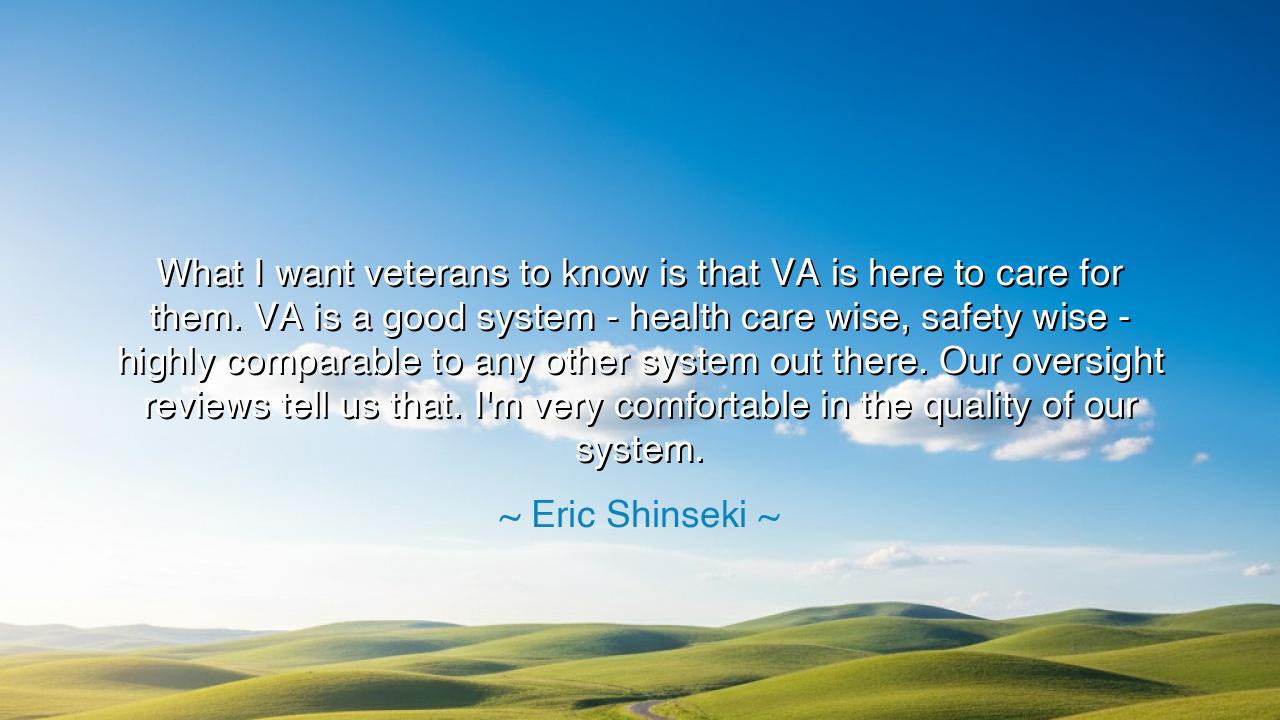
What I want veterans to know is that VA is here to care for them.
What I want veterans to know is that VA is here to care for them. VA is a good system - health care wise, safety wise - highly comparable to any other system out there. Our oversight reviews tell us that. I'm very comfortable in the quality of our system.






The honorable Eric Shinseki, a soldier of valor and servant of peace, once spoke these words of devotion: “What I want veterans to know is that VA is here to care for them. VA is a good system—health care wise, safety wise—highly comparable to any other system out there. Our oversight reviews tell us that. I'm very comfortable in the quality of our system.” At first, this may sound like the calm assurance of an administrator, but beneath it beats the steady heart of a warrior speaking to his brothers and sisters in arms. For Shinseki, who once commanded on the battlefield and later led the Department of Veterans Affairs, these words were not uttered from a distance—they were born from duty, loyalty, and gratitude. He knew that the wounds of service are not always visible, and that to care for those who have borne the weight of freedom is a sacred trust that defines a nation’s soul.
In the ancient world, the warriors who returned from battle were honored as defenders of the realm. The Greeks built temples for their veterans, the Romans offered them land and rest, and the samurai of Japan found peace in the gardens of their lords. Yet in every age, the question has remained: how shall a nation honor those who have given their strength, their youth, and sometimes their very bodies for its safety? Shinseki’s words answer this question not with ceremony but with service. The VA, in his vision, is not merely an institution—it is a covenant, a living pledge that the nation remembers.
When Shinseki speaks of being “comfortable in the quality of our system,” he is not boasting of perfection; he is affirming faith in progress, in oversight, in the enduring human will to improve. For he himself knew imperfection. He had seen the flaws of war, the wounds of neglect, the quiet despair of veterans who returned home to find the battle had not ended—it had only changed form. To him, the mission of the VA was the final campaign of every soldier’s journey: to heal, to restore, and to honor.
Think of the story of Captain William Carpenter, a Vietnam veteran who returned from war scarred and disillusioned, yet found his strength again through care, rehabilitation, and the camaraderie of fellow soldiers within the VA. His recovery was not only of body, but of spirit. In him, we see the truth of Shinseki’s promise: that the system of care, though human and imperfect, becomes sacred when guided by compassion. It is not the walls of hospitals or the tools of medicine that heal, but the spirit of service that breathes within them.
For when Shinseki assures the nation that the VA is “here to care,” he speaks not only of an institution, but of a moral duty as ancient as civilization itself. To care for the warrior after the war is to affirm the value of sacrifice, to declare that courage will not be forgotten when the banners fall. A country that neglects its veterans is like a tree that forgets its roots—eventually, it withers. But one that nurtures them grows stronger, its trunk bound by the gratitude of generations.
The lesson, then, is both noble and necessary: gratitude must become action. To thank a veteran is to ensure that systems of care endure. To build a just society, we must not measure its greatness by wealth or conquest, but by how it treats those who have served its cause. Let every citizen remember that freedom is not maintained by words alone, but by the lives of those who defended it. And when those defenders grow weary, it is our turn to stand watch.
So, children of the free land, hear the wisdom of Eric Shinseki. Remember that service does not end with war—it continues in compassion, in policy, in the steadfast protection of those who once protected you. Support the institutions that heal them, strengthen the hands that tend to them, and speak for those whose voices have grown faint. For a nation that cares for its veterans not only preserves its people—it preserves its honor.
And thus, as Shinseki reminds us, to build a system of care is to build a fortress of gratitude. Within its walls lies not bureaucracy, but brotherhood; not machinery, but mercy. To care for the soldier is to uphold the very covenant of civilization—that those who give of themselves in service shall never be forgotten, but forever be cherished, healed, and at peace.






AAdministratorAdministrator
Welcome, honored guests. Please leave a comment, we will respond soon